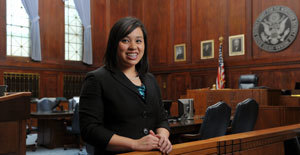Student Spotlight: Wendy Tran ’12
Aspiring Public Interest Attorney

Half of Notre Dame Law School’s first-year class—92 students—spent several days last semester exploring public interest lawyering around the country through the GALILEE program. An acronym for Group Alternative Live-In Legal Education, GALILEE introduces Notre Dame law students to the legal problems of the urban poor in ways impossible to learn in the classroom.
One participating student, Wendy Tran, recorded her thoughts throughout her experience at various agencies in Los Angeles.
Day One:
Destinations: Legal Aid Foundation of LA; Alliance for Children’s Rights
I want to prevent human trafficking. I want to work on immigration rights. I want to help those with limited English gain access to justice. The day I spent at the Legal Aid Foundation of Los Angeles (LAFLA) inspired me to pursue my dreams by reminding me of the power law can have on someone’s life. LAFLA has provided civil legal services to more than 2 million poor and low-income people in Los Angeles. It would be such an honor and privilege to be a part of an endeavor like that. Does that mean I want to be a public interest lawyer? I want to say “ABSOLUTELY!” but honestly, I’m not sure yet.
Conclusion of the day: I am still trying to discern and figure out if this is the path God has set forth for me. If anything, I do know that I will be applying for a summer law clerk position with LAFLA and several other public interest organizations.
Day Two:
Destinations: Justice Corps; Housing Project Law of LA
We spent our whole day in one of my favorite places, the courthouse. I have had experiences in the courthouse setting from internships and from my service as a court mediator. It is truly awesome to be back after having some legal education.
During the first half of our day, we met with the Justice Corps. It is the largest self-help center in the nation, serving the busiest courthouse in the nation. Litigants line up to file their case at the clerk’s office and then get in line on the other side of the room to see people at the Justice Corps who will provide legal workshops, training, and personal help filing their case and understanding what to expect from their day in court. While litigants do not walk out the door as legal experts, they are more educated and prepared to represent themselves. This court-run program seems efficient and resourceful.
In contrast, the next group we met with, a private, non-profit organization, seemed like it was struggling. We were able to see how the economy and financial climate affected this small organization. The staff was just as passionate about helping those with limited means but, because their resources were limited, they could not be as effective. What is the solution? Do they keep going and hope they make enough money to keep their doors open? Should they merge with another organization? Obviously, I don’t know these answers. What I’m coming to realize, however, is that it takes more than just heart and knowledge to do public interest work. Having access to resources is essential.
Conclusion of the day: I’m starting to see the different ways people can be involved in public interest work. Would I want to do work with a private organization? A governmental one? What about pro-bono work as a firm associate? There are so many options.
Day Three:
Destinations: District Attorney’s Office; U.S. District Attorney’s Office
Do something that matters. Do what is right for you. That has been the theme of this trip. At each of our sites, especially today, these ideas prevailed during our meetings with both the District Attorney’s Office and the U.S. District Attorney’s Office. The Deputy DAs and the District Attorney we met with seem to love their jobs. Although they told us they were constantly in court every day, all day, literally deciding on the spot their litigation plan, everyone seemed calm and content. Our meeting with the U.S. District Attorneys included a conversation with “Rich,” who comes from a family of doctors but chose law school for himself and ended up in a large firm. He wasn’t satisfied with that line of work, and decided to pursue his interests in criminal prosecution as a U.S. District Attorneys.
Conclusion of the GALILEE experience: I truly believe that everyone we met knows that the work they do matters. They inspired me. To be honest, I felt compelled to move to Los Angeles and start public interest work, but that’s silly. There is need everywhere, including in South Bend. I do know that I will use my education and training to make an impact in my community, whether I am in a busy, bustling city or a more rural environment. The main point is this: it is such a blessing to have a legal education. To whom much is given, much is required. GALILEE reminded me of why law is my calling.